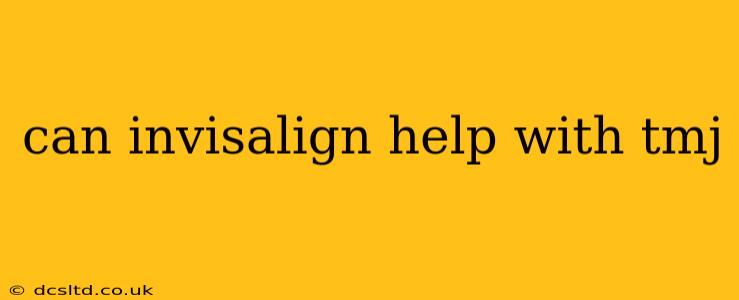Temporomandibular joint (TMJ) disorders are a common source of facial pain and discomfort. Many people wonder if orthodontic treatments, like Invisalign, can help alleviate TMJ symptoms. The answer is nuanced, and it's crucial to understand the relationship between teeth alignment and TMJ function before jumping to conclusions.
While Invisalign doesn't directly treat TMJ disorders, it can, in some cases, be a contributing factor to improving symptoms. This is because misaligned teeth can sometimes contribute to TMJ problems. Let's delve into the details.
How Misaligned Teeth Can Contribute to TMJ Problems
Misaligned teeth can lead to an uneven bite, forcing your jaw to work harder to maintain its proper position. This increased strain on the jaw joints and muscles can lead to:
- Increased Muscle Tension: A poor bite can cause muscles surrounding the jaw to tense up, leading to headaches, jaw pain, and clicking or popping sounds in the jaw joint.
- Joint Displacement: Over time, the constant strain can cause the temporomandibular joint to become misaligned or displaced, leading to more severe pain and dysfunction.
- Bruxism (Teeth Grinding): Misalignment can also contribute to bruxism, where you unconsciously grind your teeth, which further exacerbates TMJ symptoms.
Can Invisalign Improve TMJ Symptoms?
In some instances, Invisalign can improve TMJ symptoms by correcting the underlying bite issues contributing to the problem. By straightening teeth and improving the overall bite alignment, the strain on the jaw joint and muscles can be reduced. This can lead to:
- Reduced Muscle Tension: A more even bite can relax the jaw muscles, alleviating pain and discomfort.
- Improved Joint Alignment: Correcting a misaligned bite can help the temporomandibular joint function more smoothly.
- Reduced Bruxism: While Invisalign doesn't directly address bruxism, a better bite might indirectly reduce the urge to grind teeth.
Does Invisalign Always Help with TMJ?
It's important to manage expectations. Invisalign is not a guaranteed solution for TMJ disorders. Its effectiveness depends on several factors, including:
- The Severity of the TMJ Disorder: In cases of severe TMJ, Invisalign alone might not be sufficient. Other treatments might be necessary, such as physical therapy, medication, or surgery.
- The Cause of the TMJ Disorder: If the TMJ disorder isn't related to bite problems, Invisalign won't likely offer much relief. Arthritis, trauma, and other factors can cause TMJ issues independent of teeth alignment.
- Individual Response: Every patient responds differently to treatment. Some might experience significant improvement, while others might see little or no change.
What to Expect If You Have TMJ and Consider Invisalign
If you suffer from TMJ and are considering Invisalign, it's essential to consult with both an orthodontist and a dentist specializing in TMJ disorders. They can assess your specific situation, determine the underlying cause of your TMJ pain, and advise on the most appropriate treatment plan. They may recommend Invisalign as part of a comprehensive treatment strategy, or they might suggest alternative or complementary therapies.
What other treatments are available for TMJ?
Beyond Invisalign, numerous treatment options exist for TMJ disorders, including:
- Physical therapy: To strengthen jaw muscles and improve joint mobility.
- Medications: Pain relievers, muscle relaxants, and anti-inflammatory drugs can help manage pain and inflammation.
- Splints or mouthguards: To protect teeth and alleviate jaw strain.
- Surgery: In severe cases, surgery might be necessary to correct jaw joint problems.
Can Invisalign worsen TMJ?
While unlikely, it's theoretically possible for Invisalign to worsen TMJ in some rare instances. Improper treatment planning or an unsuitable case for Invisalign could exacerbate existing issues. This underscores the importance of thorough consultation with experienced professionals.
In conclusion, Invisalign can potentially improve TMJ symptoms in some cases by correcting bite problems. However, it's not a standalone treatment for TMJ disorders and shouldn't be viewed as a guaranteed solution. A thorough assessment by medical professionals is crucial to determine the best course of action for your specific needs. Don't hesitate to seek professional guidance before making any decisions.
